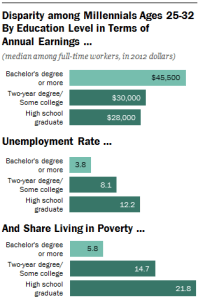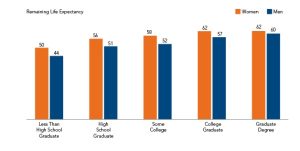If you are in high school, people have probably told you countless times that going to college should be your number one priority. The adults in your life keep saying that to get a high-paying job, you must get good grades and go to college or university.
But is that always the case? Is college worth it anymore?
Chances are high that you doubt this narrative because of the people you’ve seen online, such as creative artists, actors, musicians, photographers, comedians, dancers, emcees, and deejays who’ve become relatively wealthy without going to college.
You may have begun neglecting your studies because you discovered that you are talented in one of these areas. To help you make an informed decision, we will look at the pros (advantages) and cons (disadvantages) of going to college or university.
Pros of Going to College

While it is true, the job market has changed tremendously in the last two decades, thanks to technology, advanced engineering, and ground-breaking human studies. The need for young people to attend college remains in various sectors that cannot function without intense studying and supervision.
College education also offers other benefits outside the classroom. The following are three advantages of going to college or university.
1- College Graduates Earn More Money
Does this come as a surprise? I bet it does.
You may disagree with me because you know people without jobs and with degrees or diplomas. Or you may be following a high-school drop-out on social media running a successful business.
But, numerous studies have shown that college graduates earn more than high-school graduates over a lifetime. Reasons for this outcome include:
- Likelihood of future employment if they lose their job
- The possibility of promotion due to education level
- Employers give preference to candidates with a college education
- The indirect benefit of insurance coverage and retirement plans
- Professional relationships created in college increase employment chances
Research by PEW compared the total earnings, unemployment rate, and poverty rate for young adults between the ages of 25–32 years with various education levels. The graph below gives the comparison figures that put college graduates ahead in the three variables.

Source: PEW Research
Instead of making a decision based on the two or three people who made it without a college education, consider the overall picture of the youth in your environment.
2- College Graduates Learn Essential Life Skills
Going to college or university enables you to interact with other students and lecturers. You also join student organizations and clubs, participate in debates and discussions, and interact with high-achieving professors. These experiences help you gain essential life skills such as:
- Developing competence in your studies and future work
- Managing your emotions
- Developing interdependence skills
- Creating mature interpersonal relationships
- Establishing your adult identity
- Developing purpose and integrity
These skills have their root in the Student Developmental Theory coined by Arthur Chickering and Linda Reisser. They discovered that college students go through a series of developmental stages, including changes in thinking, feeling, valuing, behaving, and relating with others.
Going to College allows you to develop these skills that you may not learn if you do not attend college, or you may take longer to develop them. This theory explains why people of the same educational background find it easier to hang out together.
3- College Graduates Lead Healthier and Longer Lives
Yeah right, you may say.
But…
A study by Southern California University showed that adults over 65 with college or university degrees had better cognition (thinking ability) and experienced fewer years of having dementia than adults who had never completed high school or barely started college.
Another study showed that college graduates generally live six years longer than high school graduates because they have the means to live safer lives, have access to healthier foods, are mentally empowered, and can access better healthcare. The graph below compares life expectancy for people with various education levels.

Source: Population Reference Bureau
Other minor factors such as personal well-being and happiness also play a part in leading a longer, healthier life for college graduates.
Cons of Going to College
You may have heard or read on social media that you do not need to go to college for every career. Others say jobs now hire based on word of mouth, experience, or knowing someone.
In addition, people like Bill gates, Steve jobs, and Mike Zuckerberg dropped out of college before receiving their diplomas and became extremely rich. This information makes going to college seem unnecessary, and you may ask yourself if going to college is worth the time and money. Some people will say no, and here are three reasons why they hold this position.
1- College is Expensive and Can Lead to Crippling Debt
The nightmare of repaying the financial aid college and university students receive begins after graduation. Graduates spend years paying their student loans which may hinder financial growth.
According to a recent report by the Higher Education Loans Board (HELB) in Kenya, more than 85,000 student loan defaulters owed Ksh 50 billion ($ 50 million). HELB threatened to name and shame them if they did not resume or start payments. To add salt to injury, being followed up for student debt also causes prolonged emotional and mental stress.
Further, failing to make payments leads to a higher debt figure due to interest charged for defaulting. This financial situation causes college graduates to:
- Delay financial independence as they pay their student loan
- Take low-paying jobs in desperation to keep up with the loan
- Go into hiding or live in fear of repercussions for failing to pay the student debt
People who did not attend college are free from the burden of student loans and have a better chance of advancing their financial situation when they get a well-paying job.
2- A College Degree Doesn’t Guarantee a Well-Paying Job

A college diploma or degree is now accessible to more people, limiting the guarantee that you’ll automatically get a job once you clear.
Since more people have university degrees or diplomas, the entry-level job salary reduces as hundreds of graduates fight for the same position. Hence, more college graduates are underemployed or have jobs that do not require a college education.
For instance, in a recent PayScale underemployment research, 46% of Americans reported that they were underemployed, meaning that:
- They held jobs that didn’t utilize or require their education and training
- They desire to work full-time but only get part-time jobs
These statistics do not mean that a college diploma or degree is not worth it. More jobs that don’t require a graduate nowadays include having a college diploma or degree as an added advantage.
3- Technical Skills Training is Better than College Education
Technical skills (trade profession), viewed as low-level jobs for the longest time, are gaining popularity. More employment opportunities continue to emerge for these skill sets compared to a traditional college education.
Countries such as the United States are experiencing a shortage of trained technical skills workers such as:
- Machinists
- Plumbers
- Electricians
- Construction workers
- Welders and fabricators
The technical skills gap, also on the rise in Kenya, was created when more high school graduates in the past chose to go to college for white-collar job training over learning a technical skill that has the semblance of a manual job.
In Kenya, technical skills training has gained popularity, and chances of getting a job as a technical skills graduate continue to increase compared to the traditional college education. Notably, universities have been forced to begin offering technical courses or have intensified their efforts to make them more market friendly.
Is College Really Worth it?

The final decision lies with you and your parents—who can help you make an informed decision.
If your dream job rarely requires a college degree and you are confident that you’ll have regular job opportunities due to experience and referrals, you may opt out. You can still consider going for short courses that support your skills.
If you know you may struggle to make ends meet due to financial difficulties, then postponing college and looking for work may be the viable option. You can always enroll once you receive financial assistance.
Keep in mind that going to college isn’t just about finding a job and earning money; you get the opportunity to expand your worldview and pursue new passions. Consider going to college if you have the opportunity to attend and your family supports you. You can pursue other interests once you graduate.
ParenTeen Kenya can assist you in making an informed decision about the career path most favorable for you. Book a session with us today and receive reliable guidance.
Frequently Asked Questions
What are the cons of going to college?
- You’re not guaranteed a job
- You’ll have a student loan to pay
- You may not acquire technical skills
- You’ll have little to no professional networks
- You’ll be committing three to four years of your life to one thing
Why do young adults fear going to college nowadays?
- The huge cost of a college education
- College life is too stressful
- They would be missing out on earning an income
- They may not like what they studied after finishing
Do people regret going to College?
A vast majority do not regret going to college. According to the American Federal Reserve, only 9% regret going to college or university. Most report that their experiences have helped them succeed in one way or another.
Images courtesy of Pexel and Unsplash.
Jane Kariuki is a devout Christian, Clinician, Psychologist, and founder of ParenTeen Kenya. She authored an exceptional training manual used in her teens’ workshop and an instructional guidebook for her parenting classes. If she is not training, blogging, or counseling, Jane loves to spend time with her sweet husband and three children.

